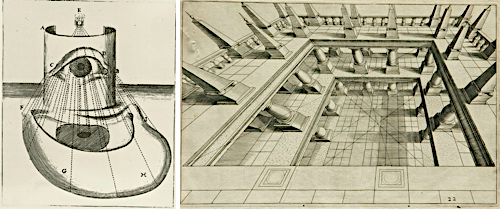
| ||||||||
| Level 100 | ||||||||
|
| ||||||||
| Level 200 | ||||||||
|
| ||||||||
| Level 300 | ||||||||
|
| ||||||||
| Level 400 | ||||||||
|
| ||||||||
| Level 600 | ||||||||
| ||||||||
| History of Art | ||||||||
| LS&A | ||||||||
| University of Michigan | ||||||||
| Back to the list of courses |
Problems in 17th Century Art and Visual Culture:
Perspectives on Perspective

By the seventeenth century perspective had come to encompass a wide range of practices and divergent aims, yet twentieth century concepts and metaphors of perspective that have shaped both the modern history and practice of art have drawn on fairly reductive models of what perspective is. Recent scholarship has begun to complicate these accounts by reassessing primary sources, reframing the historical relations between perspective and experimental optics, and considering materials from non-European pictorial and textual traditions. The seminar explores various disjunctions between pictorial practice and ideas about perspective, and their implications are for our use of perspective as a category of analysis. We will be discussing key texts on perspective from the early modern and modern periods, including those by Panofsky, Ivins, Damisch, Elkins, Kemp, Belting, Massey, and Dupré and others in order to examine and query perspective's persistent identification with particular theories of vision, concepts of space and historical distance, the 'Western' scientific gaze, and modern subjectivity itself. Alongside our reading of key texts we will be examining ways that perspective served as a means of rationalizing pictorial space, but also as a technology for looking at the contingencies and paradoxes of vision itself. Visual material will include paintings and drawings, as well as anamorphic art, maps, prints, trompe l'oeil images, optical devices, manuscript illustrations, Chinese and Japanese folding screens and hand-scrolls. Our aim will be to discover what aspects of pictorial practice have been illuminated, marginalized, and/or eclipsed in the discourse of perspective, and to explore how we might use it more profitably in the analysis of pictures and visuality. Class discussions will focus on early modern European case studies, but participants may choose paper topics from their own areas of interest and research provided that they engage substantively with the issues addressed in our readings and discussions. Course expectations include informed participation, occasional in-class exercises, a short oral presentation, and a substantial critical research paper. The seminar will be interdisciplinary in approach and students from all disciplines are welcome.
Estimated Cost of Materials: $50 or more, but less than $100.
Course Requirements: Informed participation in weekly discussions, seminar presentations, written responses to weekly readings, and a research paper of 20-30 pages.
Intended Audience: Graduate students in any field.
Class Format: 3-hour weekly meetings, including possible meetings in campus collections
Textbooks/Other Materials: Weekly readings available in PDF on CTools.